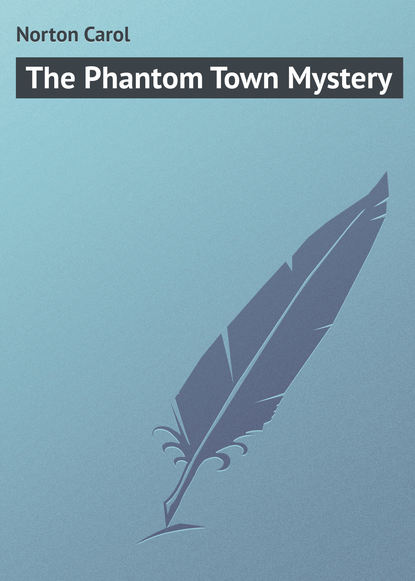По всем вопросам обращайтесь на: info@litportal.ru
(©) 2003-2024.
✖
The Phantom Town Mystery
Автор
Год написания книги
2017
Настройки чтения
Размер шрифта
Высота строк
Поля
“’Tain’t so!” He stared at them unbelievingly. “Arter all these years! Wall, wall! I’ll be dum-blasted! So Little Bodil is one o’ them nun-women.” While he talked, he went behind his counter, took an old cigar box from a high shelf, opened it and held out an envelope, yellowed with age. He handed it to Jerry. “Take it to Little Bodil. I’ll be cu’ros to hear what all’s in it.”
“So are we, Mr. Harvey,” Mary began, then exclaimed contritely, “Oh, how terrible of us. We haven’t introduced the hero of the hour. Mr. Silas Harvey, this is the air scout who located the train robbers, Harry Hulbert. He seems like an old friend to us, doesn’t he, Jerry?”
“Sure thing!” the cowboy replied, then glancing at the old dust-covered clock, he quickly added, “Dick, I reckon I must be getting along over to Bar N.”
“Goodbye, Mr. Harvey. Glad to have met you.” Harry shook hands with the old man.
When they were outside the post office, the air scout turned to the cowboy. “Jerry, can’t I be your letter carrier?” he asked. “While I was waiting for you in Tombstone I enquired about the stage. I can get back there in about an hour. Then I must fly to Tucson for a meeting at headquarters tonight. I can motor out to the convent and be back here tomorrow morning with the letter translated.”
“Sounds all right to me,” Jerry said.
“And during the hour that you have to wait for the stage,” Mary turned brightly toward Harry, “you may become acquainted with the nicest dad in the world.”
Forgetting the presence of the others, Harry replied, “Is that why his daughter is the nicest girl in the world?”
Mary flushed bewitchingly, but it was evident that she was embarrassed.
Jerry drove them up to the Moore house, waited while Dick bounded indoors to speak to his mother, then they two rode away, promising to return as soon as they could the next day.
Dora, who had been watching Jerry’s face, knew that he had been deeply hurt, but she was sure he would not say anything to influence Mary. Dora thought, “He wants her to choose the one of them who would make her happier, I suppose. Believe me, it wouldn’t take me long to decide.”
Mr. Moore had heard nothing of the robbery or the raid. Mrs. Farley had not wished to cause him a moment’s anxiety about the safety of his idolized daughter. She had told him that the girls were spending the night with Mrs. Goode in Tombstone, and, since the wife of the Deputy Sheriff had been a close friend of Mary’s mother, he had thought little of it. Even now that it was all over, they decided to merely introduce Harry as a friend of Patsy and Polly, who had come West to be attached to the border patrol.
Mr. Moore welcomed the boy gladly, and, for half an hour, they talked together of the East and the West. Mary and Dora slipped away and returned with lemonade and a plate of Carmelita’s cookie-snaps.
Then the two girls walked down to the cross road with Harry and waited until he climbed aboard the funny old ’bus and rode away.
He bent low over Mary at the last moment. Dora had not heard his whispered words, but she knew by the sudden flush that they had been complimentary.
Arm in arm they turned and walked back up the gently ascending hill-road toward their home.
“How do you like the newcomer?” Dora tried to make her voice sound indifferent.
Mary laughingly confessed, “I’d really like him lots better if he didn’t flatter me so much.”
Dora replied, “I know how you feel. I’d heaps rather have a boy be just a good pal. It makes a person feel, oh, as if she were the sort of a girl a boy thought he had to make love to, or she wouldn’t be having a good time. I’ve known steens of them, fine fellows really, who came over from Wales Military to our dances. They thought the only way they could put it over big was to flatter their partners. You know that as well as I do. Why, we Quadralettes have compared notes time and again and found the same boy had said the same complimentary thing to all four of us.” Mary made no reply, so Dora continued, “Dick and Jerry are the sort of boy friends I like. They treat us as if we could be talked to about something besides ourselves. I tell you, the girl who can win the love of Jerry Newcomb is going to win one of the finest men who walks on this green earth.”
Dora’s tone was so earnest that Mary laughed. “Goodness!” she teased. “Why all this eloquence? There isn’t any green earth around here for Jerry to walk on. It’s all sand.”
Suddenly Dora changed the subject. “Why do you suppose Little Bodil is called Sister Theresa?” she asked.
Mary replied rather absently, “Oh, I think they give up their own and choose a saint’s name. Anyhow, I’ve heard they do.”
It was evident she was thinking deeply of something else.
Her thoughtfulness continued until after supper.
“What a wonderful moonlight night!” Dora said as the two girls seated themselves on the top step of the front porch to gaze out across the shimmering desert valley, below the tableland on which they lived. “I wish Jerry and Dick would come and take us for a ride.” Hardly had she said the words when they saw a dark object scudding along on the valley road.
“Somebody is coming toward Gleeson from the Bar N ranch way,” Mary said, and Dora noted that her voice was eager, as though she wanted, very much wanted, to see her silent cowboy lover.
For a long time they sat watching the narrow strip of cross road beyond the post office. If the car turned, it would surely be coming to the Moore place. If it passed, it would be going on to Tombstone probably. It turned. More slowly it climbed the grade.
“It’s the little ‘tin Cayuse,’ all right,” Dora said. She was watching the eager light in Mary’s face, lovely in the moonlight. Then, suddenly its brightness was shadowed, went out. Dora saw the reason. On the front seat with Jerry was another girl, a glowing-eyed, truly beautiful girl, Etta Dooley. In the rumble with Dick were two freckle-faced boys, the twins. Their ruddy faces were glowing with grins of delight. “Hurray!” they shouted as the small car stopped near the front porch. “We’re out moonlight riding.”
Dick quieted them, remembering that Mr. Moore might be asleep. Mary, looking pale in the silver light, went down to the car and asked Etta if she wouldn’t get out. “No, thank you,” that maiden replied, “I’ve left Baby Bess with Aunt Mollie and we’ve been gone more than an hour now, I do believe.”
“It hasn’t seemed that long, has it?” Jerry was actually looking at Etta and not at Mary.
“Oh, indeed not!” was the happily given reply. “It’s a treat for the twins and me to fly through space. Once upon a time I had a little car of my own, but that seems ages ago.”
This did not seem like the same Etta Dooley who had been so reserved when the girls had called at her cabin home. What had happened to change her, Dora wondered.
When the car turned and the small boys, remembering to be quiet, had nevertheless performed gleeful antics, Mary went up the steps and into the house.
“I’m going to bed,” she said and her voice sounded tired.
Dora, wickedly pleased, could not let well enough alone. “I didn’t know that Etta was so well acquainted as to call Jerry’s mother Aunt Mollie.” She wisely did not add her next thought, “You’ll have to look to your laurels, Mary-mine. Etta’s a mighty attractive girl and she simply loves the Bar N ranch.”
When Dora spoke again, it was on an entirely different subject. “Isn’t it wonderful, Mary, to think that we’ve solved the mystery of Little Bodil and that tomorrow, perhaps, the boys are going to defy that Evil Eye Turquoise.”
“I suppose so,” Mary replied indifferently. Dora turned out the light and with a shrug got into bed with her friend.
CHAPTER XXIX
AN OLD LETTER
The next day, directly after breakfast, Mary and Dora began to expect someone to arrive. The roof of the front porch was railed around and when they had made their bed and tidied their room they stepped out of the door-like window and stood there gazing about them. From that high elevation they had a view of the road coming from Tombstone as it climbed to the tableland and also they could see for miles across the desert valley toward the Bar N ranch.
“Who do you think will be the first to arrive?” Dora asked as she slipped an arm about her friend’s waist.
Mary shook her head without replying. Then, because her conscience had been troubling her, Dora said impulsively, “Mary, dear, I didn’t mean, last night, that Harry Hulbert says nice things to you without meaning them. No one could help thinking you’re – ”
Mary laughed and put a finger on her friend’s lips. “Now, who’s flattering?” Then, excitedly, “I hear a car, but I don’t see it.”
“There it is, by the post office,” Dora pointed, then, in a tone of disappointment, “Oh, it’s only that funny little Jap vegetable man from Fairbanks.”
A moment later, when they were looking in different directions, they both exclaimed in chorus, “Here come Jerry and Dick!”
“There’s the Deputy Sheriff’s little car.”
In through the window they leaped, down the front stairway they tripped and were standing in the graveled walk between the red and gold border-beds when the two cars arrived, Jerry’s in the lead.
Mary’s heart was heavy, though she tried to smile brightly, when she saw that Etta Dooley was again on the front seat with Jerry. Dick, this time, was quite alone. Harry Hulbert, although in the rear, leaped out and bounded to Mary so quickly that he reached her first.
Her welcome, though friendly, lacked the eager graciousness of the day before. Harry, however, did not seem to notice it. “I’ve got the translation here,” he said, waving the old yellow envelope.
Jerry got out of his car, turned to speak to Etta and then walked toward the waiting group. Dick had already disappeared into the house in search of his mother.







